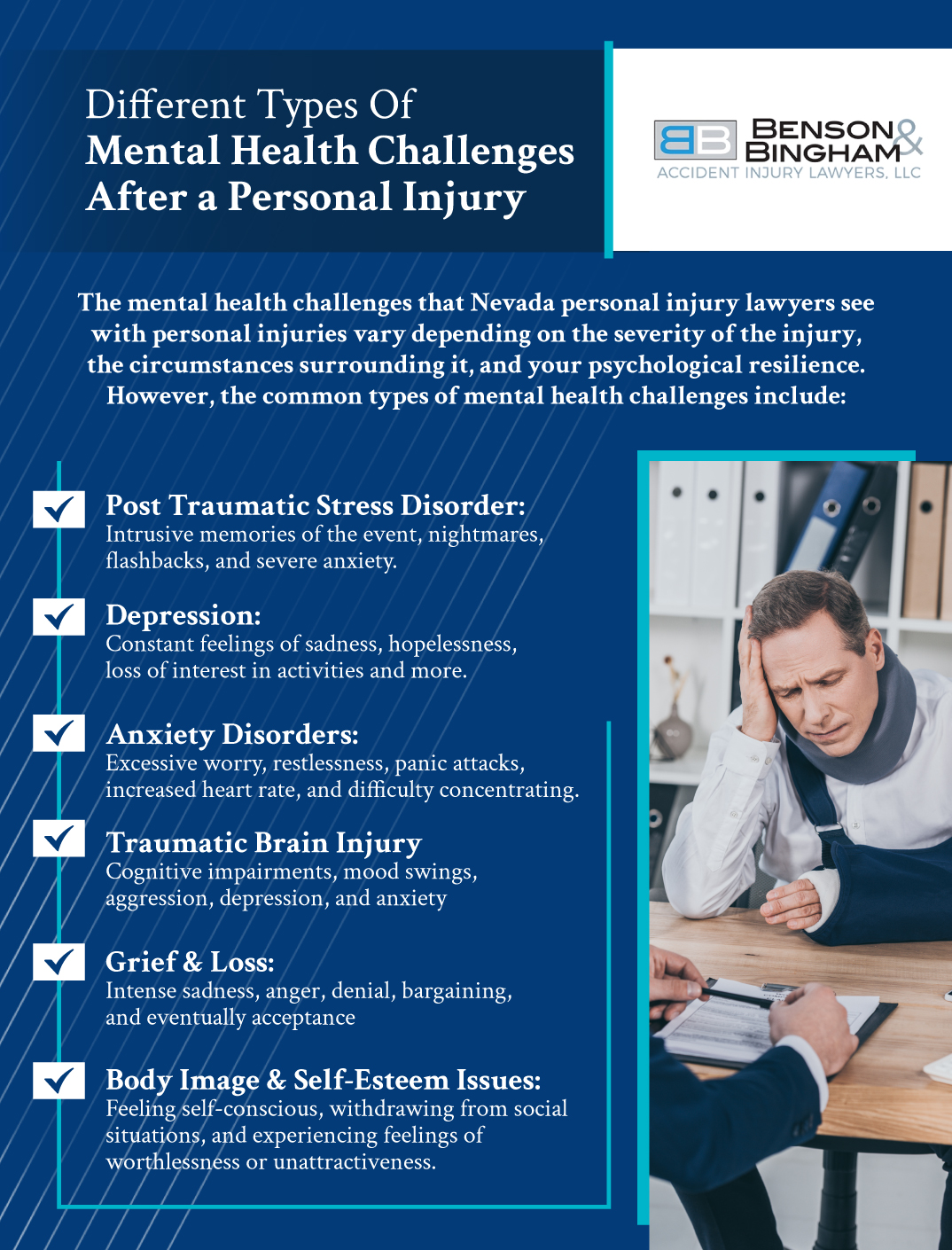
While it is important to make sure your body is taken care of, it is equally as important to prioritize your mental well-being so that you can get as close to back to normal as possible after such an event. While Las Vegas personal injury lawyers can help you when it comes to filing a claim, they also play a role in helping you get the support you need for your mental health.
How Your Personal Injury Can Impact Mental Health
Going through a personal injury can leave you feeling emotionally devastated. Some may even experience psychological trauma. Some of the distressing aspects of personal injury can include:
- Coping with pain
- Coping with a disability
- Medical expenses
- Uncertainty of the future
- Fears of missing work or losing your job
While your physical and mental recovery seem like different areas of work, the health of each can affect the other. For some, it is harder to heal physically when there is so much happening emotionally. Others may heal physically just fine, but the emotional toll changes how they live their lives.
Different Types Of Mental Health Challenges After a Personal Injury
The mental health challenges Nevada personal injury lawyers see with injured victims varies depending on the severity of the injury, the circumstances surrounding it, and your psychological resilience. However, the common types of mental health challenges include:
- Post Traumatic Stress Disorder: Intrusive memories of the event, nightmares, flashbacks, and severe anxiety.
- Depression: Constant feelings of sadness, hopelessness, loss of interest in activities, changes in appetite or sleep, fatigue, and difficulty concentrating.
- Anxiety Disorders: Excessive worry, restlessness, panic attacks, increased heart rate, sweating, and difficulty concentrating.
- Traumatic Brain Injury: Cognitive impairments, mood swings, aggression, depression, and anxiety
- Grief & Loss: Intense sadness, anger, denial, bargaining, and eventually acceptance
- Body Image & Self-Esteem Issues: Feeling self-conscious, withdrawing from social situations, and experiencing feelings of worthlessness or unattractiveness.

Types Of Mental Health Care You Should Pursue After Personal Injury
While you seek medical attention for your physical injuries, you should also consider seeking mental health care. There are different types of care you can receive depending on the circumstances including:
- Psychotherapy (Talk Therapy)
- Medication Management
- Support Groups
- Rehabilitation Counseling
- Mind-Body Therapies
- Cognitive Rehabilitation Therapy
- Art and Music Therapy
Your Las Vegas personal injury lawyer can provide referrals to professional mental health providers, ensuring you get the optimal care you need as you pursue complete healing.
Benefits Of Pursuing Mental Well-Being After a Personal Injury
Besides overall well-being, there are many benefits to pursuing mental healthcare after your injury. First and foremost, your mental health professional can help you learn strategies to help cope and manage anxiety and other mental health struggles. Second, there is evidence that suggests that healing mentally can help your body heal physically at a quicker rate.
Lastly, getting mental health help can benefit your settlement claim and help your Las Vegas personal injury lawyer acquire a higher settlement. Whether the case goes to trial or not, your mental health professional can help provide expert testimony proving that you require more compensation for your mental suffering.
How Getting a Lawyer Can Help Your Mental Health After a Personal Injury

A Las Vegas personal injury lawyer will ensure you have legal guidance throughout your case, evaluating the settlement offers and suggesting where you can negotiate. They can do the negotiations for you and represent you in court if the case should be brought to trial. Not only that, but with kindness and compassion, personal injury lawyers will listen to your case and treat it with care, making sure your rights are protected and you are getting the mental help that you need.
Let Our Las Vegas Personal Injury Lawyers Alleviate Some Stress By Taking On Your Case!
Don’t hesitate to reach out to our Las Vegas car accident attorneys at Benson & Bingham today! We know that with personal injuries comes a mental load that can be overwhelming. We want to walk with you towards healing and lightening the financial worries by negotiating a solid settlement.
Contact us to our kind and compassionate team today and get the compensation you deserve.
Read About Our Other Secret Top Tips to Maximize Your Compensation
1. Settle Faster, Settle Bigger: 20 Tips From Top Injury Lawyers for Maximizing Your Settlement
2. Understanding the Insurance Process: Navigating insurance claims and negotiations effectively.
3. Gathering Crucial Evidence: Tips for collecting and preserving evidence to strengthen your case.
4. Documenting Your Injuries: Importance of thorough medical documentation for maximizing compensation.
5. Negotiating with Insurance Adjusters: Techniques for achieving a favorable settlement offer.
6. Understanding Settlement Offers: Evaluating offers and knowing when to accept or negotiate further.
7. Considering Future Damages: Anticipating long-term medical expenses and future losses.
8. Avoiding Common Mistakes: Pitfalls to avoid that could jeopardize your settlement.
9. Calculating Your Damages: Including medical bills, lost wages, and non-economic damages.
10. Proving Liability: Strategies for establishing fault and holding the responsible party accountable.
11. Dealing with Medical Providers: Managing medical bills and liens during the settlement process.
12. Utilizing Expert Testimony: Leveraging expert witnesses to support your claim.
13.Navigating Legal Deadlines: Understanding statutes of limitations and other time constraints.
14. Preparing for Litigation: Steps to take if settlement negotiations break down and litigation becomes necessary.
15. Seeking Emotional Support: Importance of seeking emotional support during the settlement process.
16. Reviewing Legal Fees and Costs: Understanding the financial aspects of hiring a lawyer and pursuing a claim.
17. Handling Subrogation Claims: Dealing with reimbursement claims from insurance providers.
18. Staying Informed and Empowered: Keeping up-to-date with the progress of your case and asking questions.
19. Protecting Your Rights: Knowing your legal rights and advocating for fair treatment throughout the process.
20. Maintaining Confidentiality in Settlement Negotiations and Mediations


